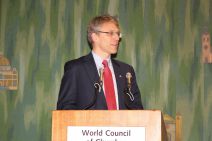World church body concerned at Korean peninsula tension

North Korea's recent nuclear test is a destabilizing action in a fragile region, says the head of the World Council of Churches.
"The current situation demonstrates an urgent need for the members of the Six-Party Talks, the six governments most responsible for peace and human security in Northeast Asia, to return to their own earlier path of negotiations and confidence-building.
"Hostility from all sides and an increased reliance on military threats are precisely the opposite of what is needed," said WCC general secretary, Rev. Olav Fykse Tveit, in a statement on Friday.
"The governments directly involved – the United States, China, Japan and Russia in addition to South Korea and North Korea – have all been down this road of confrontation and crisis before," noted Tveit.
He stressed a need to move away from "what churches there [on the Korean peninsula] have called a continual state of confrontation imposed by a narrow concept of 'security'.".
The Norwegian world church leader expressed hope for progress towards "direct contacts between the parties, multilateral negotiations and the redress of unresolved grievances."
"We also call for signs of recognition that nuclear weapons in anyone's hands are both a symptom of insecurity and a catalyst for instability," added Tveit.
The Geneva-based WCC groups Anglican, Evangelical, Orthodox churches, Pentecostal and traditional Protestant denominations in one of the world's biggest church bodies with some 560 million members.
It will hold its 10th Assembly in Busan, South of Korea, starting in October, when the WCC's highest governing body that meets about once every seven years will address the theme "God of life, lead us to justice and peace."
U.S. President Barack Obama, on 12 Feb. called North Korea's latest nuclear a "highly provocative act" and has urged "swift" and "credible" international action in response.
The White House released a statement after North Korea said it detonated a nuclear device at a test site in the northeast of the country. It noted this defied U.N. Security Council directives North Korea halt atomic activity or face more sanctions and international isolation.
U.N. Secretary-General Ban Ki-moon condemned the test, saying it was "deplorable that Pyongyang defied the strong and unequivocal call from the international community to refrain from any further provocative measures."
Other international leaders also condemned the latest nuclear test by North Korea which irked its allies, China and Russia and flies in the face of opposition to weapons of mass destruction by most Christian and other religious organizations.
